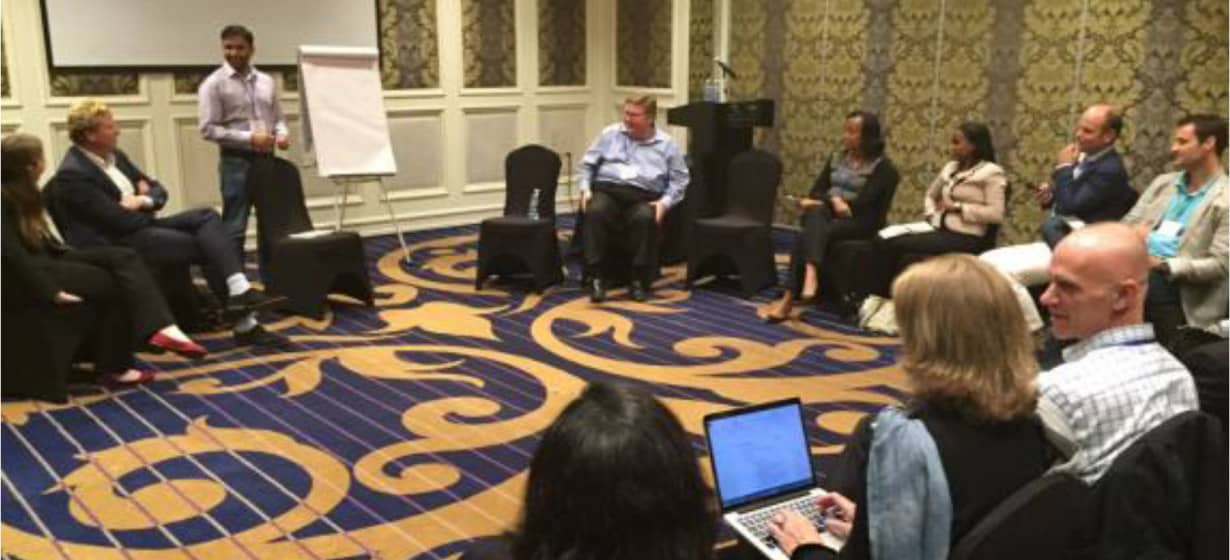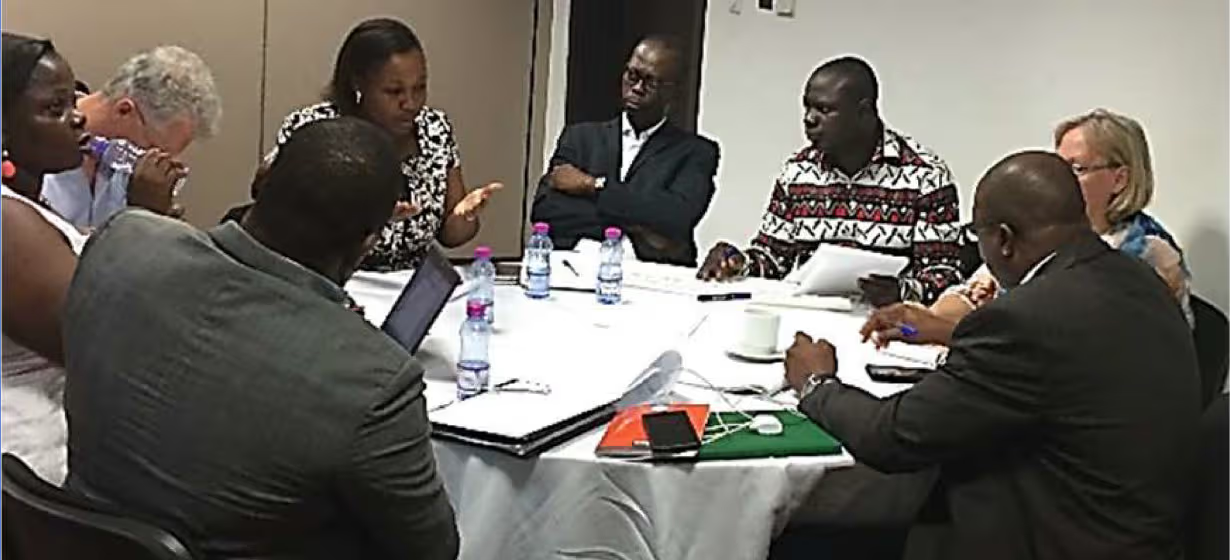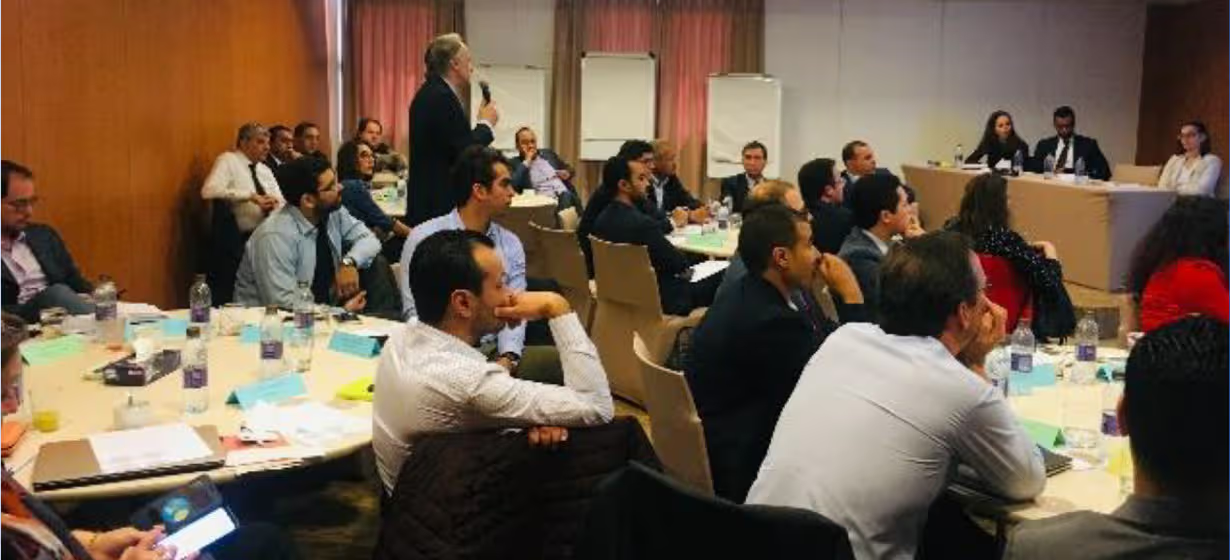DGGF generates knowledge, findings, lessons learnt and best practices via its activities that stimulate entrepreneurship in frontier markets. To capture this, the SC&BD facility has a ‘Knowledge development and sharing’ component that supports the creation of practice-oriented studies and organises knowledge sharing events in close cooperation with relevant – local – partners. The objective is to actively share insights into financing SMEs in developing countries and emerging markets and systematise knowledge exchange to accelerate sector-wide learning.
This webpage gives an overview of all published knowledge products and outcomes of knowledge events. The reports are subdivided into three focus topics:
1. Understanding the 'missing middle
a. Collaborative efforts to identify financing gaps.
b. At country level: #ClosingTheGap Series.
2. Serving the 'missing middle'
- Mezzanine finance for dynamic enterprises.
- Early-stage finance for youth-led enterprises.
- Gender lens investing for women-led enterprises.
- Deep dive on inclusive growth
- DGGF Academy
3. Scaling 'missing middle' finance
a. Enabling entrepreneurship in frontier markets.
b. Empowering Youth & Women Entrepreneurs in Frontier Markets.
1. Understanding the 'missing middle'
a. Collaborative efforts to identify financing gaps
DGGF actively builds partnerships to improve ‘missing middle’ finance. DGGF contributes its knowledge to collaborative efforts with like-minded field builders in the ‘missing middle’ finance sector. The goal is to develop frameworks that help with a common understanding of issues at stake and enhance cooperation opportunities.
Segmenting enterprises to better understand their financial needs
Small and growing businesses (SGBs) contribute to significant positive impact in emerging economies. Still, they struggle to access the capital they need to reach their full potential.
- DGGF has partnered with the Collaborative for Frontier Finance, Omidyar Network, and Dalberg Advisors to develop a segmentation framework. The aim is to help investors, intermediaries, and entrepreneurs better navigate the complex landscape of SGB investment in frontier and emerging markets.
- Segmenting enterprises to better understand their financial needs, Full report - October 2018 (pdf)
- Segmenting enterprises to better understand their financial needs, ES - October 2018 (pdf)
Closing the Gaps: Finance pathways for serving the missing middles
Small and growing businesses (SGBs) are vital for driving inclusive growth in emerging markets. Still, a wide range of financing needs have not been met. This report, commissioned by DGGF alongside the Omidyar Network, Argidius Foundation and Small Foundation, offers five alternative pathways for providing finance that meets the diverse needs of each SGB-segment and investor. The report provides insights into new approaches that innovate on traditional financing models, as well as the actions that ecosystem stakeholders can take to help support these approaches.
- Closing the Gaps: Finance pathways for serving the missing middles, Full Report - January 2020 (pdf)
- Closing the Gaps: Finance pathways for serving the missing middles, ES - January 2020 (pdf)
b. At country level: #ClosingTheGap Series
ClosingTheGap is a tool to help and support local and international stakeholders’ efforts in setting the agenda in terms of SME development. Brought together, stakeholders identify possible solutions for the main gaps interfering with the growth of local enterprises.
The series researches local entrepreneur’s characteristics and needs. It also tests assumptions related to the current financial service offering and shares insights as to their impact on the usefulness of the overall ecosystem. Special attention is paid to women and young entrepreneurs, as well as entrepreneurs in fragile states. The ClosingTheGap series looks at several regions.
2. Serving the 'missing middle'
a. Mezzanine finance for dynamic enterprises
DGGF plays an active role in establishing mezzanine finance as a new asset class for the ‘missing middle’:
- DGGF supports mezzanine finance providers through the investment portfolio and seed capital.
- DGGF has supported the development of a dedicated study, from which a ‘Masterclass’, combining in-person training and on the deal coaching, for professional investors was derived.
- DGGF leads a working group, gathering mezzanine finance providers and investors under the Collaborative for Frontier Finance.
Study on small-cap SME mezzanine finance
Mezzanine finance provides an extra offer in the SME finance ecosystem for ‘missing middle’ entrepreneurs. It blends elements from traditional Private Equity (PE) and debt financing into a unique product.
As a relatively young and rather complex segment in the impact investing space, the commissioned study 'Publication of new perspectives on financing small-cap SMEs in emerging markets: the case for mezzanine finance' provides an understanding of the specifics, diversity and complexities of mezzanine finance in the impact investing space. This study is the first of its kind and represents a first step for making small-cap SME mezzanine finance an asset class on its own.
- Publication of new perspectives on financing small-cap SMEs in emerging markets: the case for mezzanine finance - May 2016 (pdf)
Mezzanine masterclass
This executive training session is dedicated to investment professionals who are currently deploying capital. These professionals are looking to adjust their product offering to their target clients and are operating markets by adopting a differentiated approach from debt and equity.
The training session is focused on skill development through deal structuring. Case studies are used to help with this. The diversity of experiences among peers and the trainer help with the learning experience.
b. Early-stage finance for youth-led enterprises
DGGF plays a leading role in furthering thoughts on building more sustainable early-stage finance models:
- DGGF supports many early-stage finance providers through the investment portfolio and the SC&BD facility. This includes accelerators, angel networks and early-stage VC funds.
- DGGF supported the development of a dedicated study. From which a cluster emulated under the Collaborative for Frontier Finance.
Scaling access to finance for early-stage enterprises in emerging markets: Lessons from the field
Many SMEs in developing countries have difficulty securing the financial backing they need to grow. These SMEs are often referred to as the ‘missing middle’. They have outgrown microfinance but do not yet have access to regular financial services. There are many challenges for ‘missing middle’ segments. However, early-stage enterprises face even bigger challenges, and the lack of financing limits their growth.
The report seeks to explore how to improve the scalability and viability of early-stage finance provision, thereby reducing the need for philanthropic capital and subsidies to the local providers of finance and support to early-stage enterprises.
- Study on scaling access to finance for early-stage enterprises - January 2019 (pdf)
Technical Assistance to support entrepreneurship programme Mella – Ethiopia
Mella is an entrepreneurship programme in Ethiopia. It was launched by Novastar Ventures, an Africa-based venture capital firm focusing on investment in Ethiopia, Kenya, and Nigeria. Mella has support from DGGF Financing Local SMEs. Mella’s virtual platform connects a young audience with successful entrepreneurs and inspires them in their ambitions of starting or growing their businesses.
- Entrepreneurship Programme Mella - Ethiopia - May 2020 (pdf)
Innovative approaches to angel investing in Africa
Investment from angel investors into African startups has grown rapidly in recent years. The fast development of startup ecosystems resulted in a strong increase in the number of investable opportunities, and some recent early signs of success have further spurred interest from angel investors around the world. This increased investment appetite is both enabled and accelerated by new approaches to organized angel investing. These new innovative approaches combine elements of traditional angel investing, crowdfunding and venture capital, and make it more cost-efficient and easier for angel investors to invest in African high-growth ventures. This is an important development, as such companies are key to stimulating (youth) employment, innovation and competitiveness of African economies. DGGF offers TA to several angel investors in Africa. This paper explores these new approaches to organized angel investing and aims to raise awareness around the continuous need to innovate and to make finance more accessible for African high-growth ventures.
African Angel Investment Survey 2022
This research, commissioned by DGGF and implemented by Briter Bridges in partnership with African Angel Business Network (ABAN) and African Angel Academy (AAA), explores the activities and demographic backgrounds of angels operating across Africa. This is the first edition of an annual series that has been discussed at the African Early Stage Investment Summit #AESIS 2022. The recording of the knowledge roundtable at the Africa Early Stage Investor Summit is available here.
African Angel Investment Survey 2023
This research, commissioned by DGGF and implemented by Briter Bridges in partnership with African Angel Business Network (ABAN) and African Angel Academy (AAA), explores the the rapidly evolving realm of angel investing in Africa. The results of this report have been discussed at the African Early Stage Investment Summit #AESIS 2023.
African Angel Investment Survey 2024
This research, commissioned by DGGF and implemented by Briter Bridges in partnership with African Angel Business Network (ABAN) and African Angel Academy (AAA), explores the the rapidly evolving realm of angel investing in Africa. The results of this report have been discussed at the African Early Stage Investment Summit #AESIS 2024.
c. Gender lens investing for women-led enterprises
DGGF has been building its own gender lens investing (GLI) understanding:
- DGGF supports a few GLI funds through the investment portfolio and SC&BD facility
- DGGF supported the development of a dedicated study. From the study, a definition for outreach to women entrepreneurs was created.
- DGGF is building a comprehensive TA offer around strengthening the gender awareness of local financial providers.
Serving the financial needs of women-owned businesses in emerging markets: Perspectives from the DGGF portfolio
The research focused on what could be learned from concentrating on the SMEs financed by the funds in which DGGF has invested. The analysis of the DGGF portfolio revealed that 20% of the underlying SMEs are majority or minority-owned by women. To be able to invest in women-owned businesses, fund managers need to proactively seek out female entrepreneurs and understand how they go about their work. Women may not actively seek external financing.
- Serving the financial needs of women-owned businesses in emerging markets: Perspectives from the DGGF Portfolio - August 2018 (pdf)
Technical Assistance to support Gender Lens Investing at Alitheia IDF Fund
DGGF supported Alitheia IDF Managers with technical assistance to clarify and strengthen their Gender Lens Investing fund proposition. One of the outcomes of this support is the study 'The Case for Gender Lens Investing: Alitheia IDF Fund', authored by MEDA.
- Case Study Gender Lens Investing - September 2018 (pdf)
d. Deep dive on inclusive growth
To continue learning about the effectiveness of DGGF’s investment strategy and its contribution to inclusive growth, DGGF and MFA contracted Steward Redqueen to perform a deep dive study on this theme. The deep dive evolves around the key questions of “why, how and to what extent does DGGF contribute to inclusive growth?
- Deep dive on inclusive growth - September 2023 (pdf)
e. DGGF Academy
SC&BD actively shares insights into financing SMEs in emerging markets to accelerate sector-wide learning but actual knowledge transfer requires structured peer to peer learning exchanges. The DGGF Academy is a way to scale DGGF’s capacity to demonstrate new models of SME finance provision and accelerate the replication of demonstrated innovations.
- DGGF Academy - December 2023
3. Scaling ‘missing middle’ finance
a. Impact Report ‘Enabling entrepreneurship in frontier markets’
DGGF’s impact report ‘Enabling entrepreneurship in frontier markets’ shares the success stories and lessons learned of five years of DGGF investments (2014-2019). Inspiring case studies from local entrepreneurs demonstrate the positive impact of DGGF’s contribution so far. In those five years, DGGF – Financing local SMEs has been able to create a positive impact in 60 countries by, among other things, supporting 33,316 jobs and financing more than 4,500 SMEs through its support to local finance providers.
- ‘Enabling entrepreneurship in frontier markets’ - June 2019 (pdf)
b. Conference Report ‘Closing the SME Finance Gap: Empowering Youth & Women Entrepreneurs in Frontier Markets’
On 1 October 2019, Triple Jump and PwC hosted the conference 'Closing the SME Finance Gap: Empowering Young & Women Entrepreneurs in Frontier Markets' at the Compagnietheater in Amsterdam. This was done on the behalf of the Dutch Good Growth Fund (DGGF) Financing Local SMEs initiative. In this conference report, you can find a roadmap to scaling the SME finance offer as well as insights from each of the break-out sessions during the event.
- ‘Closing the SME finance gap’ - October 2019 (pdf)



